ESPERANZA SPALDING / “I Adore You”
Kalamu just finished an epic two-week overview of Milton Nascimento recordings. Coincidentally, the first time I heard Esperanza Spalding she was doing a cover of Milton’s “Ponta De Areia.” I wasn’t blown away by it, but I did find it quietly smoothly enjoyable.
Esperanza’s voice reminds me a little of Flora Purim’s, except with less ‘edge.’ Like Flora (and Milton, come to think of it), Esperanza sounds particularly good when she’s singing sounds (or just scatting) instead of singing lyrics.
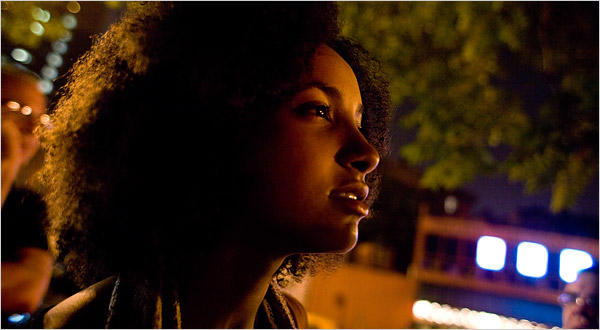 It was only later that I discovered Esperanza is a songwriter and composer as well as a singer. That got my attention. There are lots of young ladies out there who can sing some – not nearly so many who can sing and write. Then I heard another couple of her tunes – an atmospheric vocal piece named “Espera” and a rollicking samba/jazz number, “I Adore You.”
What impressed me most about these tunes, especially “I Adore You,” was the quality of the band. The pianist (Leo Genovese) has this way of really striking the keys. He almost sounds like a percussionist. And speaking of percussion, the interesting percussion work throughout the piece (by Jamey Haddad) serves to fill in the empty spaces and gives the band’s performance that extra funk and soul. But the best thing about the band had to be the rhythm section – the drummer (Horacio ‘El Negro’ Hernandez) and the bass player were just plain swinging! At one point, the bass player takes a solo and Esperanza is right there with him, scatting along note for note. I couldn’t wait to get the CD to find out who the bass player was.
It was only later that I discovered Esperanza is a songwriter and composer as well as a singer. That got my attention. There are lots of young ladies out there who can sing some – not nearly so many who can sing and write. Then I heard another couple of her tunes – an atmospheric vocal piece named “Espera” and a rollicking samba/jazz number, “I Adore You.”
What impressed me most about these tunes, especially “I Adore You,” was the quality of the band. The pianist (Leo Genovese) has this way of really striking the keys. He almost sounds like a percussionist. And speaking of percussion, the interesting percussion work throughout the piece (by Jamey Haddad) serves to fill in the empty spaces and gives the band’s performance that extra funk and soul. But the best thing about the band had to be the rhythm section – the drummer (Horacio ‘El Negro’ Hernandez) and the bass player were just plain swinging! At one point, the bass player takes a solo and Esperanza is right there with him, scatting along note for note. I couldn’t wait to get the CD to find out who the bass player was.
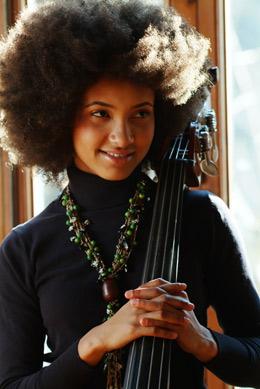 Undoubtedly, some of you are already ahead of me on this one, but for the rest of you, prepare yourself to be surprised when I tell you the bass player is none other than Esperanza Spalding herself.
So, to summarize, this young lady is a vocalist, a lyricist, a composer, a bandleader and a fricking bass player. And of all her talents, I have to say the one I least expected – her playing on the acoustic bass – is the most highly-developed. (Ever try to play stand-up bass? I have. One thing I can guarantee you: Esperanza may have rosy cheeks and a winning smile, but she also has the fingers of fifty-year-old carpenter. Bass strings don’t bend easy.)
Undoubtedly, some of you are already ahead of me on this one, but for the rest of you, prepare yourself to be surprised when I tell you the bass player is none other than Esperanza Spalding herself.
So, to summarize, this young lady is a vocalist, a lyricist, a composer, a bandleader and a fricking bass player. And of all her talents, I have to say the one I least expected – her playing on the acoustic bass – is the most highly-developed. (Ever try to play stand-up bass? I have. One thing I can guarantee you: Esperanza may have rosy cheeks and a winning smile, but she also has the fingers of fifty-year-old carpenter. Bass strings don’t bend easy.)
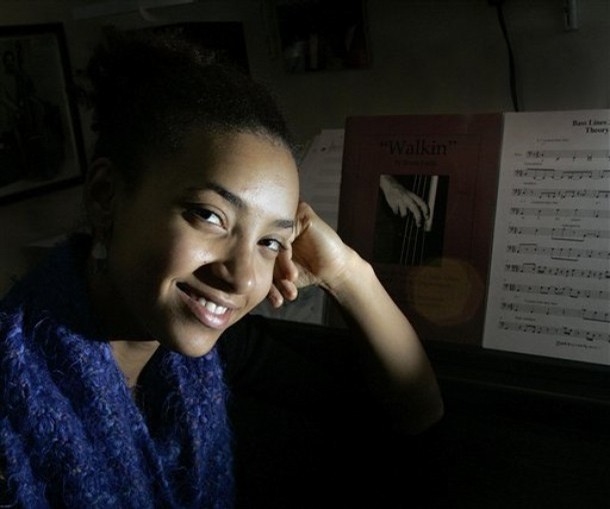 Not impressed yet? Wait ‘til I tell you what Esperanza Spalding does as a day job. Try professor of music at Boston’s prestigious Berklee College. Unbelievable, right? Sky’s the limit.
Bonus tracks: “Mela” and “If It’s True.” All five mentioned songs are from Esperanza Spalding’s 2008 release Esperanza.
—Mtume ya Salaam
That’s Not The Half Of It
Not impressed yet? Wait ‘til I tell you what Esperanza Spalding does as a day job. Try professor of music at Boston’s prestigious Berklee College. Unbelievable, right? Sky’s the limit.
Bonus tracks: “Mela” and “If It’s True.” All five mentioned songs are from Esperanza Spalding’s 2008 release Esperanza.
—Mtume ya Salaam
That’s Not The Half Of It
"One day I went into the high school, into the high school that I went into, and the bass was just — it's kind of funny, it was kind of heavenly, you know? I walk into this room, and it literally — it's kind of below street level, and light was shining in, and the bass was just there with no case on it, because they just bought it. And I walked into the room and picked it up and just started playing. "And at the same time, my music teacher came in and showed me basically what a blues form was, and I just kind of started making anything up. And pretty much from that moment, I said, 'Wow, this is — in these five minutes, I'm enjoying this music more than I have the last 10 years on the violin'." —Esperanza Spalding
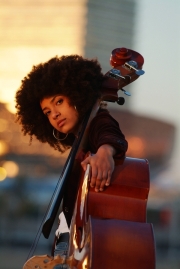 It was a stunning sight. Donald Harrison Quartet playing hard and the bass player easily keeping up even though she was neither as tall nor as wide as the acoustic instrument she wielded with such aplomb. Her afroed head bobbed, her petit foot patted, her small hands moving smoothly didn’t seem to be straining in the least. And at the end of one blazing number when all the band was laughing and she smiled a dazzling smile, I said to myself: damn, she got it!
That was about two years ago, later, of course, I heard her records and subsequent to that was even more impressed when I heard a radio broadcast of one of her European concerts. I—and thousands of others—had been right in our initial assessments: she had it. In fact that’s the way Pat Methany as a visiting professor at Boston’s Berklee College of Music had broached the verdict to Esperanza:
It was a stunning sight. Donald Harrison Quartet playing hard and the bass player easily keeping up even though she was neither as tall nor as wide as the acoustic instrument she wielded with such aplomb. Her afroed head bobbed, her petit foot patted, her small hands moving smoothly didn’t seem to be straining in the least. And at the end of one blazing number when all the band was laughing and she smiled a dazzling smile, I said to myself: damn, she got it!
That was about two years ago, later, of course, I heard her records and subsequent to that was even more impressed when I heard a radio broadcast of one of her European concerts. I—and thousands of others—had been right in our initial assessments: she had it. In fact that’s the way Pat Methany as a visiting professor at Boston’s Berklee College of Music had broached the verdict to Esperanza:
"I recognized right away that she had a lot to say and was also unlike any musician I had ever run across before. Her unique quality is something that goes beyond her pretty amazing musical skills; She has that rare 'x' factor of being able to transmit a certain personal kind of vision and energy that is all her own." —Pat Metheny
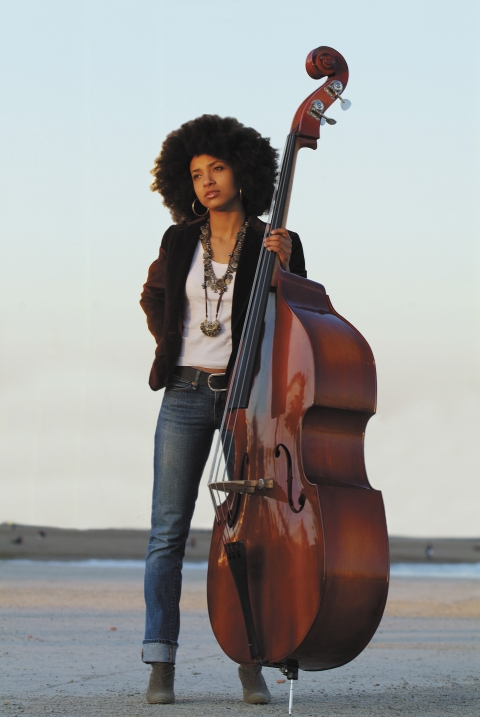 When Mtume called and told me he was writing about Esperanza, he couldn’t see my smile as I asked him if he knew her back story. He said no. I told him it’s fascinating.
Born 1984 and reared in Portland, Oregon (her mom is Welsh, Native American and Hispanic, her pops is African American), Esperanza started playing violin at age 5 and was home schooled until high school.
She taught herself well enough that she earned a spot in The Chamber Music Society of Oregon.
She was accepted into a prestigious arts high school but dropped out.
Earned a GED and then was accepted into Portland State University. Dropped out.
When Mtume called and told me he was writing about Esperanza, he couldn’t see my smile as I asked him if he knew her back story. He said no. I told him it’s fascinating.
Born 1984 and reared in Portland, Oregon (her mom is Welsh, Native American and Hispanic, her pops is African American), Esperanza started playing violin at age 5 and was home schooled until high school.
She taught herself well enough that she earned a spot in The Chamber Music Society of Oregon.
She was accepted into a prestigious arts high school but dropped out.
Earned a GED and then was accepted into Portland State University. Dropped out.
It was just hard for me to fit into a setting where I was expected to sit in a room and swallow everything that was being fed to me. Once I figured out what it was like to be home-schooled and basically self-taught, I couldn’t fit back into the traditional environment. —Esperanza SpaldingInstead of running away from home and joining the circus, Esperanza jumped into the Portland club scene and Joined five or six bands. Fortunately, it worked. Gigging in a wide variety of musical situations was her apprenticeship. Esperanza grew as a result of the lessons she learned by playing with others. Respect for her elders is one quality that not only saves her but also elevates Esperanza. She is always willing to learn the lessons those with more experience offer her. From the outside it may look like she gets all the breaks but consider that many of ‘the breaks’ are offered to her because she has been a willing mentee even if she has rebelled against the constrictions of formal education.
There are a lot of great musicians in Portland that don’t have much to do but hang and teach and be phenomenal resources. I was good enough to pass, and people may have thought I had potential that wasn’t being cultivated. I got lots of opportunities to play beyond my level, which is the best way to get better. When people kick your butt, you feel that pain and go home and practice, and you hope that will alleviate your pain. I think that’s been the case in every band I’ve been in. There were so many phenomenal bass players in that city at that time, I never got a taste of mediocre fledgling musicians. They were all great: Dave Friesen, Phil Baker from Pink Martini, Glen Moore from Oregon, and my personal teacher, [Oregon Symphony bassist] Ken Baldwin. I was constantly striving to be on the level of these guys. I was playing gigs with people they played with. —Esperanza SpaldingA major education was playing in a blues band led by Sweet Baby James Benson—she credits them for “kicking her butt” and forcing her to learn the music, but then she also credits a bunch of jazz cats around Portland, and then there was the period she spent working as bassist, lead singer and songwriter with the alternative band, Noise For Pretend. Imagine every Sunday she’s playing the blues with Sweet Baby James and The Original Cats. Excluding her young years, the average age of the band members is at least 55. It must have been quite a sight, a bunch of old geezers throwing down some hard-ass blues and who is on bass: a sassy young thing who’s not street legal, not even old enough to drink. At the same time she’s being mentored by journeyman jazz musicians who are giving her mixtapes of music to learn and recommending records she ought to be studying up on. And those cats don’t play; they call her out on her mistakes and on all the music she doesn’t know. Get your act together or forget about it.
Yeah, there was one guy in particular. His name was Thara Memory. I was terrified of him! He would look at my compositions and yell, “No, get serious!” Later, he chilled out and became one of my mentors. —Esperanza Spalding
 Meanwhile she’s also writing lyrics for and standing out as the front person in Noise for Pretend, an indie trio composed of Esperanza on bass, lead vocals and lyricist; Ben Workman on guitar and vocals; and Christian Cochran on drums. Formed in 2000, Noise For Pretend debuted with four tracks on an EP shared with another band—Split: Blanket Music / Noise for Pretend (2001) and followed up with their own release—Happy You Near (2002). Both CDs are available through iTunes.
Meanwhile she’s also writing lyrics for and standing out as the front person in Noise for Pretend, an indie trio composed of Esperanza on bass, lead vocals and lyricist; Ben Workman on guitar and vocals; and Christian Cochran on drums. Formed in 2000, Noise For Pretend debuted with four tracks on an EP shared with another band—Split: Blanket Music / Noise for Pretend (2001) and followed up with their own release—Happy You Near (2002). Both CDs are available through iTunes.
I started writing lyrics when I was about 15 or 16 for a group I sang and played in called “Noise For Pretend”. The group would compose a song, and then say, “Esperanza, can you write lyrics for this?” I had never done it before, so I just started thinking of sounds in words that would compliment the melody, and I would just write about any old subject. Cars, chalk, prostitutes, airplanes, anything. Back then, I felt a lot more free and creative when writing, because I didn’t feel I had to write about love. Now, that I’ve done an album with plenty of songs directly about love, I definitely want to move back into more diverse subjects. And, of course improve and expand my skills as a lyricist. Songwriting in the sense of writing music, I have been doing since I was 5 or 6 according to my mother. —Esperanza SpaldingEsperanza has all of that going for her on top of ten years experience as a classical violinist. No wonder college was not appealing. Darrell Grant, her PSU college professor, urges her to apply to Berklee, she resists, he keeps urging, finally, intentionally ‘after’ the formal deadline, she calls Berklee; a hasty audition is arranged in Seattle. She drives up, aces the audition and is offered a full scholarship. She has no money. Esperanza and friends throw a benefit party, with the funds they raise, she ships her bass to Boston, catches a plane and has a couple hundred to survive on. During her first semester at Berklee she seriously considers dropping out: to get to school it’s a long commute with her bass on public transit (including a two mile walk just to get to the metro); she’s not fond of the intense rivalry among the students; and although she is clearly smart and talented, she does not respond well to mainstream educational structures; plus, she’s broke. Once again a gig is a saving grace. This time Patti Austin was hiring a band for the “For Ella” summer tour in Europe focusing on celebrating the music associated with Ella Fitzgerald.
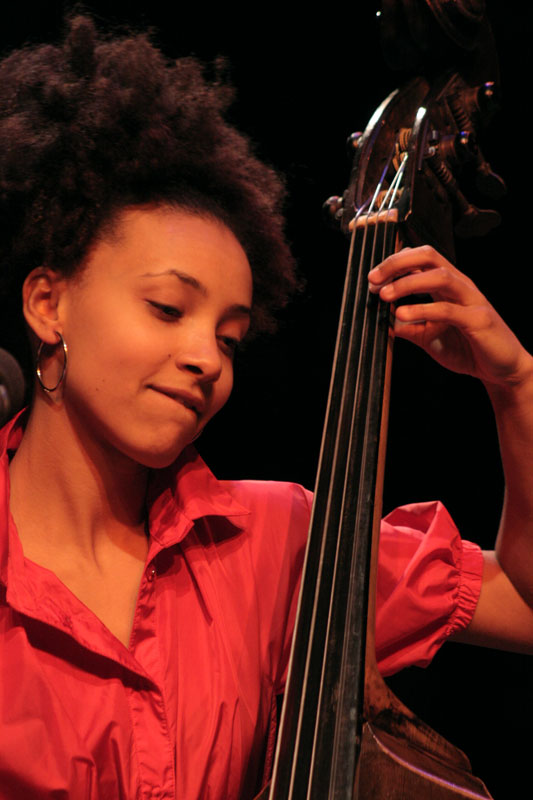 Thrice again Esperanza aces the audition and gets the gig, which intermittently continued for three years.
Thrice again Esperanza aces the audition and gets the gig, which intermittently continued for three years.
You can think it’s this fun and amazing thing. But you learn how it really works—how to be on your game every night no matter what. I learned how to play the same music night after night and keep it fresh and interesting. I learned how to accompany a singer, which is very important. Along with the standard American songbook, we were playing a lot of bebop. —Esperanza SpaldingThe money from the tour enables Esperanza to continue at Berklee, moreover, when she returns off the road with Patti, numerous other offers start coming her way. Esperanza accelerates her course work so she can complete the four year program in three years. During that period…you guessed it, she gets another gig. This time veteran tenor saxophonist and Berklee professor Joe Lavano is putting together a new band, guess whom he selects to be the bassist. And then… (by now, I’m sure the pattern is obvious), then upon graduation she is offered a one-off summer instructional spot at Berklee teaching bass. Once again, she aces the assignment and once again is offered the gig. This time, at 20 years old, the job is a faculty position. Not bad for a high school (and college) drop out.
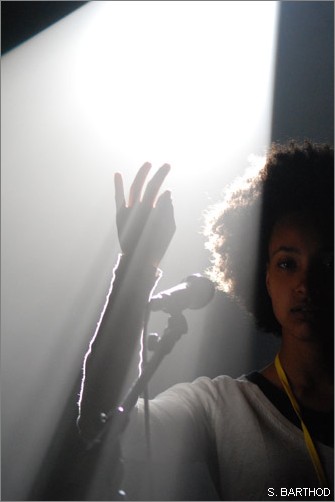
Berklee is an unbelievable institution of music. The most significant concept I learned was to figure out what I needed to do and then find my own way to do it. Through all my years as a student, I was never a fan of formal academics or the conventional school setting. I feel that I spent too much of my practice time working on material that teachers told me I needed to learn without those instructors really understanding my ultimate goals. I acquired so much information as a student, but it wasn't always relevant to what I was trying to accomplish. You have know what it is you need to work on, set goals, and then figure out the best way to achieve those goals. You have to analyze your playing and recognize the types of things which are causing you to experience problems. No one is ever going to understand your playing as well as you so you have to figure out things for yourself. —Esperanza Spalding
* * *
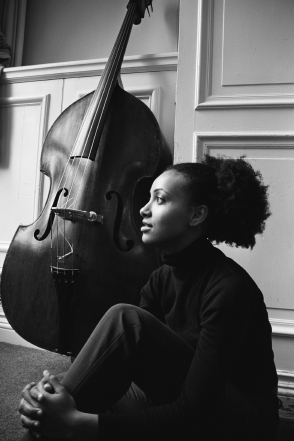
…the way my mom helped to shape my growth was that she would always let me play. If I wanted to play music, she’d be all for it. She was extremely supportive of whatever music was coming out of me. She went to college briefly, because she wanted to play jazz guitar. Going with her to her class, I would sit under the piano. Then I would come home and I would be playing her stuff that her teacher had been playing. I was probably about eight. —Esperanza SpaldingEsperanza is obviously inspired by her mother who, like many single women rearing a family, was a multi-talented, miracle worker.
She was very strong-willed, very independent,” says Spalding. “She did a million things. She was a baker, a carpenter, she worked in foster care homes, she worked in food service, she worked with Cesar Chavez as a labor organizer. She was an amazing woman. She was hip enough to put a lot of negative things I saw as a child into some kind of context – even before I fully understood what she was saying. —Esperanza SpaldingHer mother sang but gave up a formal career to rear two children although later went back to college to study music. The example was set: regardless of the extenuating circumstances, whether economic, political or creative, do your thing.
JazzReview: You've mentioned elsewhere that you have an extraordinary relationship with your mother. she's an amazing woman, isn't she - A single mother who made sure that you not only survived, but thrived under some difficult circumstances? Esperanza Spalding: You know, I am hesitant to answer that question because I don't want to patronize her. That is the objective of all single mothers. Some have access to more resources than others, some are more resourceful than others. My mother is a phenomenal woman, as many women who sacrifice some of their personal wants and devote their life energy into the well being of their child. If I announce that like it's special in my mother, I fear it may sound like I view it as an anomaly. But, in fact, that happens all around the world every day. And, thank god for the strength of the human spirit that in the types of situations mothers like mine, and thousands of other have experienced, they were able to keep themselves afloat and raise healthy, strong-headed children.
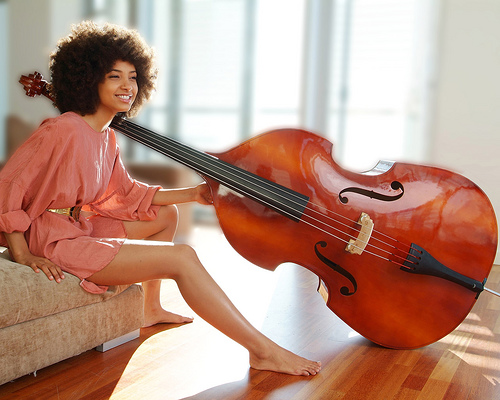 Esperanza is not only an educational non-conformist, she’s also young, attractive and female pursuing a profession that is male dominated and within which the role of the female has traditionally been rigidly defined and generally limited to singing.
Esperanza is not only an educational non-conformist, she’s also young, attractive and female pursuing a profession that is male dominated and within which the role of the female has traditionally been rigidly defined and generally limited to singing.
The tricky part is taking responsibility for your self. It’s really easy to say, “Everybody treats me like a woman!” and it’s true, however many women make the mistake of over sexualizing themselves. The hard thing, in the beginning, is to learn how to present your self in a totally professional way so that you're not inviting any of that. There's a way to behave where you are not over sexualizing yourself as a woman, but it's hard to learn because in most situation it's to your benefit. Every woman that’s pretty knows how to use it, the tricky thing is to know how not to use it! But really, really, really, tricky part is to make sure that your music is together like any other man. And then when you present yourself, you have to do it totally professionally and platonically, if there is such a word. Once you learn how to present yourself, respect yourself, and have faith in your music, it's not hard to do. —Esperanza Spalding
Most of the gender issues that existed 50 years ago are no longer present today. Women musicians can really do whatever they want. I know many young female musicians, and I see dangerous patterns develop regarding their interaction with other musicians. It is very easy to allow personal dynamics to enter into a learning or playing situation, but you have to always remember that you are there to play music. As a woman, there is a tendency to put out a sexual energy and allow that energy to come back at you so women have to learn how to present themselves in a professional manner. It can be hard to do, but you shouldn't be playing just to attract attention. We often see an over-sexualized image of women behavior which might be fine for television, but it can really hinder your growth as a musician. If you want to be a professional musician, treat music as your job. —Esperanza Spalding
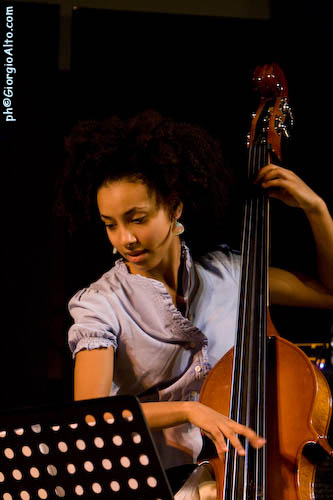 As a child Esperanza played violin in a classical context and achieved concertmaster level at age 15 when she decided to give up the violin, a time period that coincided with dropping out of high school and most importantly this was also when she picked up the bass.
As a child Esperanza played violin in a classical context and achieved concertmaster level at age 15 when she decided to give up the violin, a time period that coincided with dropping out of high school and most importantly this was also when she picked up the bass.
Right away when I picked up the bass, I loved how the sound resonated through the instrument. I would lay my head on it's shoulder and let the notes vibrate through my head. Other than that, right away I was able to communicate and play improvised music with people. That I had never really experienced before. So, that was another draw. My desire to learn more about how to better uphold my role as a bassist in that communication lead me into listening to jazz. —Esperanza SpaldingWhen people respond to her music part of what they are responding to is a unique approach to music making, an approach that is common in jazz but is increasingly uncommon in music in general: study the basics on your own and learn the deeper stuff by the experience of working as a professional (and usually working with those who are way above your level). A lot of musicians are self-taught but not many develop a holistic approach to music making. Esperanza never focused solely on bass playing. She was more interested in the relationship between the bass and the other instruments, which in turn led to her way of singing based on the relationship of the melodic line to the bass line, except she is playing both lines. Her middle name could be “counterpoint.” It’s this synergy of two becoming one that is the core of her music. Yeah, she’s an attractive young woman and yeah her airy soprano endears her to audiences, but there’s something else happening and that something else—her approach to music making—is what people are responding to. Whether her audiences understand the importance of Esperanza’s approach and the weight her experiences carry is not the question. Esperanza understands. She knows what time it is and continues to build her development on the foundation of prior experiences and searching out unique ways of music making.
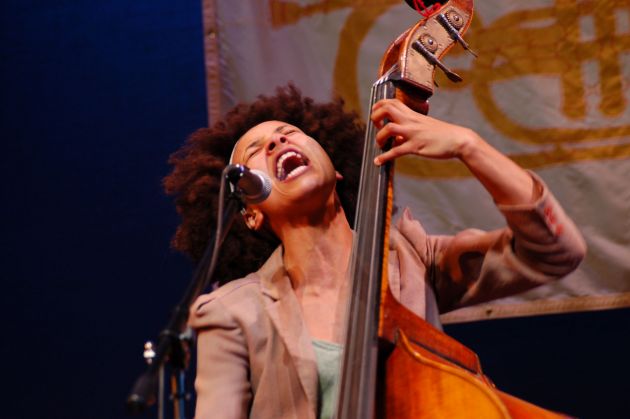
[Singing while playing bass] started with Noise For Pretend. I would play simple bass lines and sing simple melodies. Then I started getting into playing them more independently and more creatively. Often at home I’d be practicing tunes and singing the melodies to see how they all worked together. Through that process I started wanting to sing tunes live. When I’m singing, in my mind I’m always thinking of harmony. I’m always hearing different types of chords or progressions imposed on my singing, and I allude to those. On the bass I hear a lot of melodic lines, probably from listening to vocal lines. I’m always talking about counterpoint. It’s the yin and the yang; the bass tends to imply whatever the melody is. It’s about making the right kind of contrary motion. —Esperanza SpaldingOnce she seriously started studying jazz bass at Berklee, Esperanza developed what had begun in a pop context in Portland.
I don't really study too many bass players. If I hear a tune and the counterpoint that's happening with the bass player and other instruments is impressive then I'll learn what both parties are doing - so, like If I hear something and I'm like "Damn, how did Ron Carter think up those notes when he heard Herbie do this" - I'm always interested in the counterpoint, so I'll transcribe it trying to learn what they were doing together. Maybe I'll sing what Herbie's playing on piano and learn on the bass what Ron Carter is doing...When I was younger I used to transcribe a lot of [alto saxophonist] Cannonball Adderley. He definitely influenced my playing because the range of the alto, where it is on the bass is in this area that's known as the blackout zone - this area where you're crossing from thumb to regular position without thumb - and because the range where he always plays is in this area and I used to transcribe a lot of his solos, I think it gives me a type of freedom in that area that allows me to play differently than other players. I don't know, but I notice that I play differently in that area than other bass players, and I'm sure it's because of all the Cannonball that I transcribed. So, he definitely influenced my bass playing a lot. Again, all the bass players that I love, I love them because of how they interact with the rest of the band. I've never been a bass line transcriber. —Esperanza Spalding
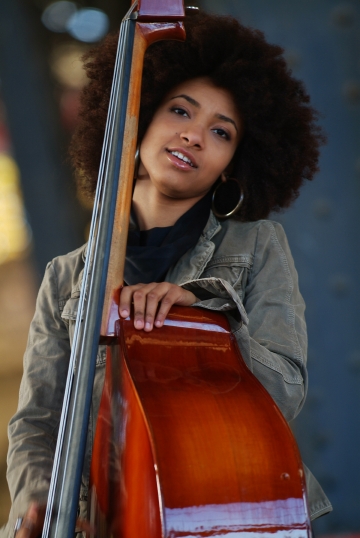 Most of the press skips over the connection between ten years as a violinist playing classical music and Esperanza’s approach to writing music that combines melody and harmony through rhythm. You don’t play highly structured music that long and not develop an affinity for or at least an understanding of how to put a song together. Whether you are able to do it well is a separate question, the main thing is that you understand how musical elements interact to form a whole.
Although Esperanza’s stint as lead vocalist and bassist with Noise For Pretend is where combining singing and bass playing started, it’s interesting that in that pop music context Esperanza continued to play acoustic rather than switching to electric bass. There is clearly a strong element of “go it my own way regardless of the popular conventions” functioning in Esperanza’s personality.
Most of the press skips over the connection between ten years as a violinist playing classical music and Esperanza’s approach to writing music that combines melody and harmony through rhythm. You don’t play highly structured music that long and not develop an affinity for or at least an understanding of how to put a song together. Whether you are able to do it well is a separate question, the main thing is that you understand how musical elements interact to form a whole.
Although Esperanza’s stint as lead vocalist and bassist with Noise For Pretend is where combining singing and bass playing started, it’s interesting that in that pop music context Esperanza continued to play acoustic rather than switching to electric bass. There is clearly a strong element of “go it my own way regardless of the popular conventions” functioning in Esperanza’s personality.
I want to keep getting better at everything I'm currently doing including becoming a master bassist and vocalist. I really want to improve my arranging for strings, large ensembles, and big bands with horns. I also want to play and record with all of my musical heroes. —Esperanza Spalding
* * *
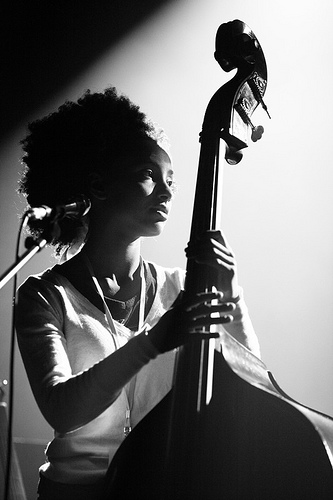
Everybody should read and everybody should think more than they read. Like Sam Cooke said, “If you don’t read history and you don’t know what’s going on in the world what are you going to put in your music?” Because your stuff probably isn’t as hip as you think it is. You have to know what’s going on! —Esperanza SpaldingIt’s interesting that Esperanza evokes both strong supporters and strong detractors. Some of her fans hail her as a prodigy, while her detractors say she’s making it simply because she is a pretty female face playing an instrument usually dominanted by older men.
No-one around now knows how good I was or wasn't on violin. I mean, wow, I know a lot of kids that play violin, and it sounds terrible! It's just an instrument. Fortunately for me, that wasn't my only means of expressing music, which is really what we're talking about when we say "prodigy". It means, someone has an advanced ability to naturally express their inner music. In that sense, I don't think I was or am a prodigy; I just wasn't corralled into a strict method, or ideology of music, so I was free to find out about sound and expression in my own way. I think that freedom carried over rapidly to the bass and voice. And, I am sure now, more than my technique on either instrument that is what people will be drawn to and even impressed by; my expression and heart in the sounds. —Esperanza SpaldingLike a host of email contributors to the All About Jazz internet forum, most of the people who complain that Esperanza is an “over night” success or that she lacks experience don’t know that even though she’s 24 years old, she’s been actively involved in making music for two decades. It’s only taken her 20 years to become an overnight success! But beyond that there is another, generally unacknowledged reality: the American audience for hard jazz is very, very limited. During one of her many interviews available online, Esperanza was asked did she find a difference between playing in the States and playing abroad. She said yes because when she plays abroad she has much more freedom to experiment. Her first offer to record as a jazz artist came from Vyva Musica, a record company based in Barcelona, Spain and the session was with two Cuban-born musicians, pianist Aruan Ortiz and drummer Francisco Mela, both of whom she played with frequently while at Berklee. Although issued under her name, Esperanza says Junjo, her debut jazz recording, was actually a collective effort and is mostly instrumental. The new album, which entered the Billboard Jazz Charts at number three and rose to number two, is the eponymous Esperanza and only has one instrumental. My initial response was it’s good but not great mainly because I didn’t think her singing was strong enough to carry the album—I like a heavier, stronger, darker vocal style. When I copped some of the live broadcasts from Europe, I was excited about what I heard: a depth of expression and creativity that I found somewhat muted on the American release. Making it as a jazz musician in 21st century America is no easy task. Actually, it’s never been easy but now the audience for jazz has shrunk considerably. Esperanza understands, which is why she made the type of record she did for her American debut as a jazz artist.
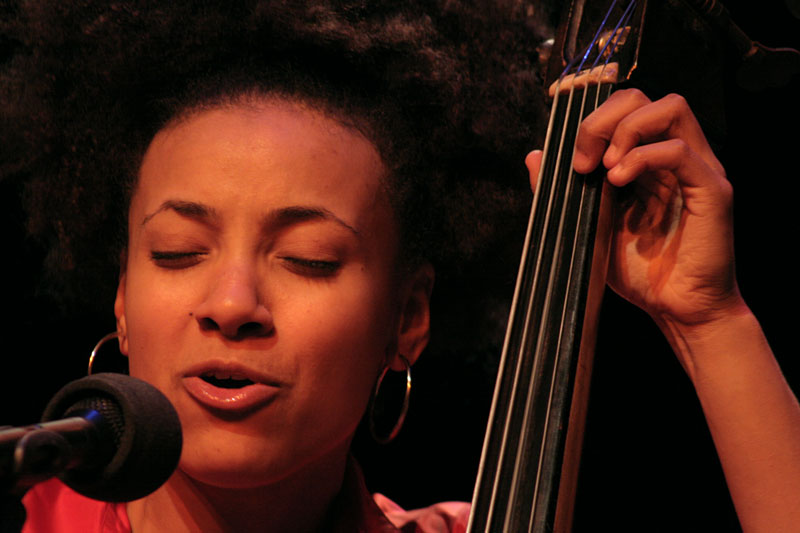
My objective was to create a record that contains a lot of the creative forces that exist in jazz and improvised music. Also, to create music that someone with a developed ear or someone who just wants to enjoy the music can appreciate. —Esperanza SpaldingThere is no easy way out (or through) the wilderness of commercial recordings in America. If you are a jazz artist, you have a tough row to hoe but if anyone can do it, if any young jazz artist can figure out how to survive and even thrine within today’s entertainment industry, Esperanza is one of the ones who can do it. She has not only demonstrated an amazing ability to remain independent and be successful at the same time, she also has a clear mind and a good heart. She understands that great jazz is ultimately a people’s music and not simply an industry product marketed to make money.
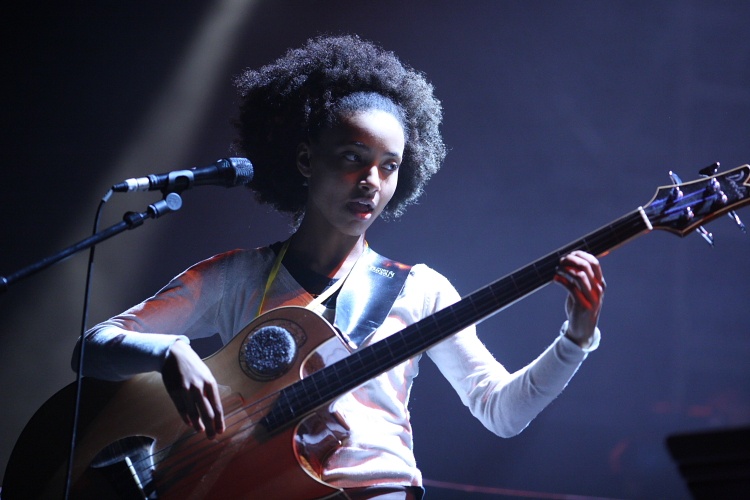
Based on what I know about myself right now, what I really want to do is reach people. I want to make great music, but I also want to use that talent to lift people up, and maybe show them some degree of hope where there might not be any in their lives. My name means ‘hope’ in Spanish, and it’s a name I want to live up to. —Espranza Spalding
This entry was posted on Monday, August 18th, 2008 at 12:01 am and is filed under Contemporary. You can follow any responses to this entry through the RSS 2.0 feed. You can leave a response, or trackback from your own site.
6 Responses to “ESPERANZA SPALDING / “I Adore You””
August 21st, 2008 at 8:29 am
I am sooooo thankful to have popped in this week and read this article. Stumbled across Esperanza in the iTunes Store a few months ago and loved her music as soon as I heard it. Now reading your masterful account of her backstory, I’m an even bigger fan. Been trying to awaken some of the courageous music inside me for a while now, and reading about other women who’ve been through a similar path is very encouraging. Thanks, as always, for the passion and honesty in your write-ups!
August 26th, 2008 at 3:51 pm
This story is truly inspiring on so many levels: it inspires me as an artist, as a mother, as a woman, and as a human being. Baba, thanks for sharing her story in such depth.
August 29th, 2008 at 8:09 pm
Thanks for sharing ! Wow! What a talented young woman. I am elated to own a copy of her CD. I have been playing it nonstop since I purchased it. I played the cello for years and was a part of the Virginia youth orchestra. Listening to Esperanza causes me to rekindle the memories of those days of playing, although her music is much more hotter and more eclectic!
June 23rd, 2009 at 10:57 am
What an amazing story of an artist so young and innovative. She inspires me to dig deeper in terms of expressing my music. I’m also impressed with the fact that she is an excellent sight reader as well as an accomplished technician. Also an excellent vocalist. What a breath of fresh talent!
June 1st, 2011 at 6:42 pm
What a talented young person who obviously has a beautiful soul. If she didn’t, her music wouldn’t flow and she wouldn’t be in such a great groove. Thanks to her for sharing the love; her hard work and the gift she gives her listeners. Your article is very insightful. Thanks!
Leave a Reply
| top |